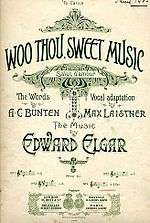Salut d'Amour
Salut d'Amour, Op. 12, is a musical work composed by Edward Elgar in 1888, originally written for violin and piano.
History
Elgar finished the piece in July 1888, when he was romantically involved with Caroline Alice Roberts, and he called it "Liebesgruss" ('Love's Greeting') because of Miss Roberts' fluency in German. When he returned home to London on 22 September from a holiday at the house of his friend Dr. Charles Buck, in Settle, he presented it to her as an engagement present.[1]
The dedication was in French: "à Carice". "Carice" was a combination of his wife's names Caroline Alice, and was the name to be given to their daughter born two years later.[2]
It was not published by Schott & Co. until a year later, and the first editions were for violin and piano, piano solo, cello and piano, and for small orchestra. Few copies were sold until Schott changed the title to "Salut d'Amour" with Liebesgruss as a sub-title, and the composer's name as 'Ed. Elgar'. The French title, Elgar realised, would help the work to be sold not only in France but in other European countries.[3] Schott was a German publisher, with offices in Mainz, London, Paris and Brussels.
The first public performance was of the orchestral version, at a Crystal Palace concert on 11 November 1889, conducted by August Manns.[4] The first recording of that version was made in 1915 for The Gramophone Company with an orchestra conducted by the composer. As a violin-and-piano piece Salut d'Amour had been recorded for The Gramophone & Typewriter Ltd (predecessor to The Gramophone Company) as early as 1901 by Jacques Jacobs, leader/director of the Trocadero Restaurant orchestra. Auguste van Biene recorded a cello transcription in 1907.

"Salut d'amour" is one of Elgar's best-known works and has inspired numerous arrangements for widely varying instrumental combinations. It was even arranged as a song "Woo thou, Sweet Music" with words by A. C. Bunten.[5]
Notes
References
- Kennedy, Michael, Portrait of Elgar (Oxford University Press, Third ed., 1987) ISBN 0-19-284017-7
- Moore, Jerrold N. Edward Elgar: a creative life (Oxford University Press, 1984) ISBN 0-19-315447-1
External links
- Salut d'amour: Scores at the International Music Score Library Project